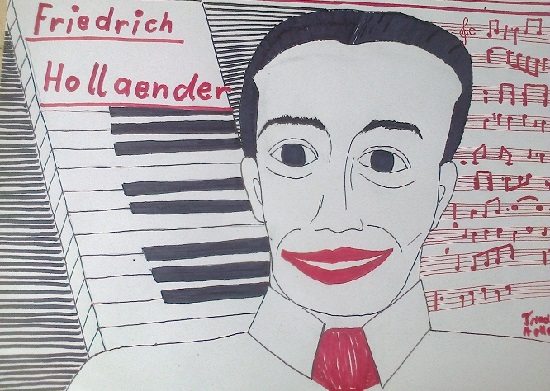BERLIN HAT DEN JAZZ

Friedrich Hollaender was born in London in 1896. He came from an extremely musical family. She returned to Berlin at the turn of the century. There they had the best contacts to the cultural scene. In his youth he often played the piano in a silent film theater near the family`s apartment. There he trained spontaneous improvisation to perfection. Then he studied at the Stern Conservatory. During the First World War, he directed the orchestra in a front theater on the Western front. His serious music became more entertaining.
The Cabaret Composer
In the 1920s, Hollaender became a fixture on the Berlin cultural scene. He was tingling through the cabarets Berlin was full of. Like-minded people as Kurt Tucholsky, Walther Mehring or Blandine Ebinger and Trude Hesterberg surrounded him.
So he was becoming one of the best known composers of Cabaret and Revue, Jazz gained an ever-greater influence on all types of his compositions, including those for Film. For some years he as well was married to the singer Blandine Ebinger, as they were working and performing together. And she would take over his Cabaret Tingel Tangel after his escape from Germany in 1933. After the WWI however he was made musical director of the Grosse Schauspielhaus by its director Max Reinhardt.
Friedrich Hollaender and Jazz
His music contributed to Berlin becoming the linchpin of the European jazz scene in the mid-1920s (cf. Bratfisch, Jazz in Berlin, p. 30). In 1927 he got to know the Weintraubs Syncopators. And he was overwhelmed. From then on he played the piano in the band. He later reported on their collaboration. „We studied jazz for weeks.“ We sat around the record player for hours. ”(ibid p. 46). That way the band managed to really get the Jazz. And from now on she played the music written by Hollaender in all Revues. Such as in “ Bitte Einsteigen ” in 1928 together to Josephine Baker, directed by Rudolf Nelson. Due to constant disturbances of the show by SA members in the audience, the premiere had to be cancelled and the play removed from the schedule.
Or they appeared in films. For example they were in „Der Blaue Engel“ with Marlene Dietrich in 1931. In 1930 Hollaender wrote the music for the film „Burglars“ with Sidney Bechet.
In exile
Three years later Friedrich Hollaender had to flee from the the country because of his Jewish origin. As film composer he found exil in Hollywood worked for Charlie Chaplin and Billy Wilder. The last one he had known from Berlin as Abraham Wilder. (cf. ibid p. 55).
See also: KIND OF GOLDEN – The New West
Friedrich Hollaender, Jhonny (Marlene Dietrich)
Blandine Ebinger & Friedrich Holländer, Piano – Wenn ick mal tot bin (1929)